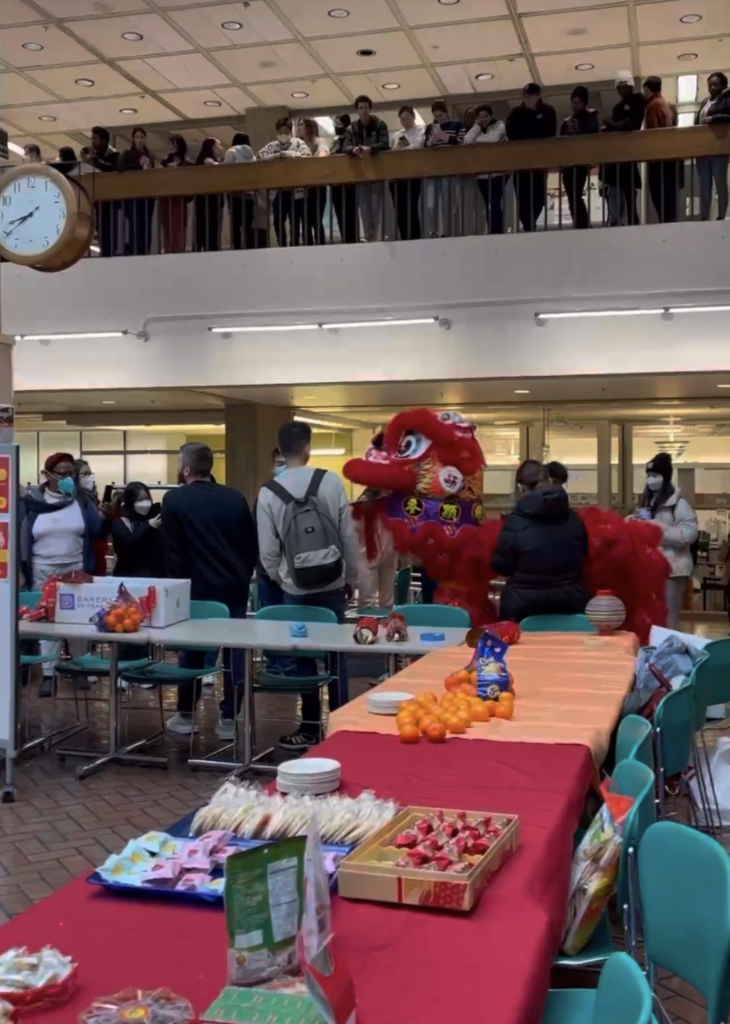For the past two years, it has been rare to attend in-person social events due to COVID-19. But this year, as the pandemic seems to fade, Seattle Central College (SCC) students and staff can finally celebrate in person, bringing members of the community together to mark meaningful events.
The SCC community gathered in the Atrium of the Broadway Edison building on Tuesday, Jan. 24, to welcome the Lunar New Year–the Year of the Rabbit. The event began at 11:00 a.m. with a live lion dance performance and ended around 2:00 p.m. The schedule was simple in order to respect everyone’s busy schedule around campus; lion dance at the beginning and enjoying food for the rest of the event.
The event was organized by the SCC Student Leadership, including the College Activities Board and the Asian American and Native Asian American Pacific Islander Serving Institution (AANAPISI). The International Ambassadors from the International Programs (IP) of the community colleges also took part in the planning.

Planning for the celebration started at the beginning of the Winter 2023 academic quarter, and the Seattle Collegian was able to closely follow its development, as well as the event itself.
Many familiar faces could be seen at the event. Students, faculty, staff, and college employees came by to see the event and try the free food that was served. Since it was held during a Tuesday around midday, many students and faculty had classes to attend, so the amount of people varied drastically from minute to minute. The biggest crowd arrived at the start of the celebration. So many people attended that the food almost ran out. The dumplings were the most popular dish of the festivity, and, unsurprisingly, they did not make it past the first 30 minutes. People—including myself—also went crazy for the spring rolls.
Other traditional East Asian foods and snacks served included banh tet, mứt (candied fruits and vegetables), kẹo mè xửng (sesame candy), Mongolian milk tea, barley tea, and oranges. Some other more common foods were haw flakes, white rabbit candy, and rice crackers.
We asked event organizer, Kano Cheng, about planning and her thoughts on the event.
As the Events and Activities Specialist at Student Leadership, Cheng was the main coordinator of the event. She said that she and her team wanted to convey to the public the diverse ways of celebrating Lunar New Year by gathering and sharing all kinds of traditional foods. Food preparation, serving, and sharing were particularly important, Cheng described, but trying to do this while being at the college could be difficult. Food had to be cooked in small batches, so it took some time and required help from several people communicating responsively and synchronously to make it happen.
“I make dumplings together with family and friends,” Cheng said, but since she has been away from home for years, she has been crafting paper lanterns and doing calligraphy–the reason and inspiration for a calligraphy activity at the event today. There were also board game activities.
Besides sharing food, people also play cards, mahjong, and board games with their families during Lunar New Year celebrations. Some members of the board committee mentioned they also do according to Cheng. “I just hope that people will come and enjoy the event,” she said before Tuesday, “whether they want to try the food or the activities, or if they want to see a live lion dance, or if they just like the atmosphere of the event. Lunar New Year is a time for joy and community, and I wanted to express that to everyone that attended.”
The lion dance at the start of the event, which attracted so many passers-by and was shared over social media by many spectators, was a performance by the Mak Fai Kung Fu Dragon & Lion Dance Association.
We also talked with international student from Mongolia, Undral Batmunkh, who is also one of the International Ambassadors for IP. The IP department brings many students to campus who observe the Lunar New Year. Therefore, a lot of international students were present at the event.
On the table where IP was located, the event attendees could get hot barley tea and a delicious Mongolian milky tea, as well as water bottles. Batmunkh expressed happiness for finally being able to celebrate for the first time at an in-person Lunar New Year event in Seattle, especially as a member of the Asian community at our school. For many students who eagerly looked forward to enjoying this annual event, social restrictions and rules by the government to minimize virus propagation had been canceling many of their plans to enjoy these festive dates previously.
“Back in my home country,” Batmunkh explained, “we celebrate Lunar New Year for the whole 15 days. It is a big celebration of the New Chinese Zodiac Year, and we also celebrate for the upcoming spring, which is also a partial Spring festival.” As her words indicate, Batmunkh will be spending some time this winter reconnecting with her culture. She also said she will be celebrating Mongolian Lunar New Year on February 22. In Mongolia, they celebrate Lunar New Year 30 days after the Chinese Lunar New Year.

There are twelve animals in the Chinese zodiac, and each has a meaning regarding the personality of people born in that year. For example, people born during 2023, the Year of the Water Rabbit, may be gentle and intuitive.
All around Seattle, this year represents a substantial change in how we have been celebrating outdoor social events for the past three years. COVID-19 vaccination requirements and restrictions are being lifted. We see new businesses taking over where old ones lost their ground during the pandemic, and we also see the revival of those that survived.

As we all transition to a more open phase of life, it is good to think about what these celebrations mean. Lunar New Year means wishing for good fortune, wealth, health, and prosperity for the new year. If the success of the Lunar New Year event is an indication of the future, it looks like the Year of the Rabbit will bring many blessings to the Seattle Central community.
Author

Francisco Fonseca is the Web Manager for The Seattle Collegian.
He is originally from Buenos Aires, Argentina.











Be First to Comment